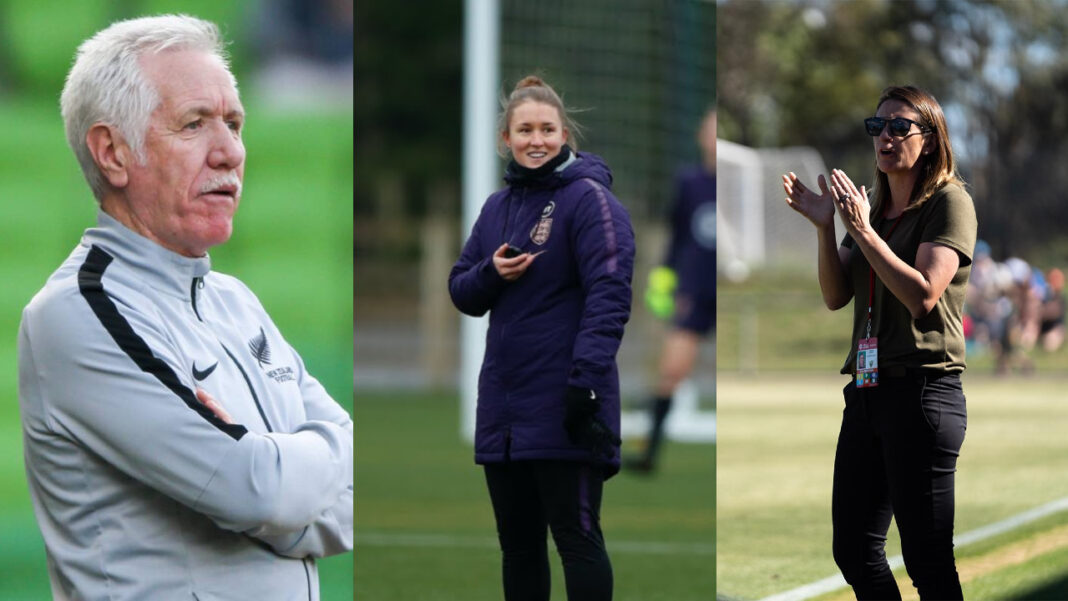
The 2020 Australian Coaching Conference was held this Saturday 28 November in an inaugural online format. Co-hosted by Stephanie Brantz and Adam Peacock, the Conference included presentations from the likes of former Arsenal coach Arsène Wenger, England women’s under-17s head coach Lydia Bedford, former Matildas coach Tom Sermanni, under-20s and Future Matildas coach Leah Blayney, former Matilda and W-League coach Heather Garriock, and current Matilda Lisa de Vanna.
Football Australia created this event alongside National Technical Director Trevor Morgan and Coach Education Manager Sean Douglas, with the purpose of developing Australian coaches through conversation and reflection of current coaching practices. The 2019 State Coaching Conference was held at Valentine Sports Park with 400 participants, however this year due to COVID-19, almost 2000 people were registered to watch the online event.
Read below to see the top things we learnt about developing and coaching female players.
That's a wrap… the 2020 Australian Coaching Conference with @footballnsw had thousands of coaches across the country today tune in and watch numerous presentations that are sure to provide some food for thought going forward.
Thank you to all involved who made this happen! pic.twitter.com/lJABRbC97J
— FFA Coach Development (@FFA_Coaching) November 28, 2020
Person First, Footballer Second
As a coach, it’s vital to see your players as people first. Former Matildas coach and current New Zealand national team head coach Tom Sermanni spoke about the importance of having a personal connection with the players you coach, knowing who makes them ‘tick’, and listening to them as the first step in deciding what’s best for the team.
Lisa de Vanna believes that knowledge is power when it comes to coaching a team. The more you know about the players as people off the field, the better results you’ll get from them on the field. Speaking from personal experience, de Vanna says that as a coach you’ll benefit greatly from understanding your players as people, understanding their emotions and showing them respect. “It’s about knowing your players, and how to get the best out of them”, she said.
Transitioning from Player to Coach
As a former Matilda turned W-League coach, Heather Garriock talked about the difficulties of this transition. Garriock believes there is a significantly different player mentality to coaching mentality. “As a coach you are less selfish…it’s not about you, it’s about the team”, she said.
The former Canberra United coach spoke of learning to become a brave leader who “says what’s right and holds people accountable… you don’t need to be the coolest; it’s about what’s best for the team”.
Garriock also discussed the idea that not all good players are good coaches from the beginning. There is a perception that players who become coaches should already know what they’re doing, when in fact this might not always be the case. Coaching is a learning journey, and just because you’ve played before doesn’t mean you instantly know how to coach.
Great football experience in the breakout rooms Dr Ron Smith – “Insight into Coach & Youth Development” & next door Tom, Heather & Lisa on “Developing the next generation ….” #ACC2020 @footballnsw @FFA_Coaching pic.twitter.com/aAI0dTvt7A
— Football Coaches Australia (@FC_Australia) November 28, 2020
A Changing Game
Lisa de Vanna has played with the Matildas since 2004, with 150 caps to her name. Throughout that time, the forward has noticed some changes.
“I felt a sense of that ‘never say die’ Matildas feeling… now I feel it’s more like ‘what can I get from the Matildas’ rather than ‘what can I give to the Matildas’ a little bit”, she said.
“It’s really different. We’re better players now, but the heart and soul of the game was better ten years ago. It’s more the social media side of things now.”
It’s a sentiment that Sermanni agrees with. He believes social media and pay rises are unmovable dynamics that have changed the game, which has made managing professional teams more complex than in previous years.
Playing with the Boys
In the past, there was considerably less participation in women’s football, which meant the few girls who did play often ended up being in boys’ teams. Today however, the numbers have drastically risen, meaning we have enough players for all female teams.
Although increased participation is a positive, Sermanni believes that not playing with boys has negatively impacted the elite end of the female professional spectrum.
“It’s very important if you want to be an elite player that you have to play at the highest level and the toughest level…the expectations for boys are higher than the expectations for girls” he said.
“I think there’s a move back to girls playing with boys now, and I think that’s a positive thing. It’s a big plus for young girls who are ambitious to go out and play with boys”.
https://twitter.com/JoFernandes_33/status/1332522656369807361
Managing Female Teams
Sermanni believes that there are some crucial differences when it comes to managing female football teams. Keeping tabs on the little issues that arise is at the top of the list.
“It’s not about all the big things, it’s about keeping on top of all the small things…the difference in the women’s team is that small things can fester more. You just deal with issues as they crop up.”
He also says that being a consistent personality is key, so players know what to expect in their respective footballing environments. For example, on football camps (which often last for weeks), making life as normal and consistent as possible means there is less chance for issues to arise.
Understanding Why
From grassroots to professional leagues, we all play football for different reasons. When coaching a team, Tom Sermanni says it’s important to understand why your players want to be there. For some, it’s to improve their skills and make it professionally. For others, football is a great platform to make friends and have fun.
From a coach’s point of view, having expectations relative to the goals and skill level of your team is vital. No matter who you’re coaching, football is the game we all love, and the memories that we’ll have of the beautiful game over the years are often shaped by the coaches we have along the way.






